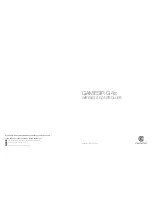
4. Check the programming of the Automatic Switching On/Off Functions (see User’s
Guide) and the Sleep Preference (code 75).
5. Check that the power supply on the outside of the equipment is working correctly
and check that there are no oxides or moisture at the connection points. It must be
remembered that, very often, in areas where food items are handled, small rodents
may be present, which may attack the cables even if placed in inaccessible places.
6. Open the equipment case, consulting Chapter 1.4 of the User’s Guide, check that
inside there are no traces of humidity caused by formation of moisture or water
infiltration and that all the components are fitted properly on the printed circuit board
and do not show signs of burning.
THE WEIGHT DISPLAY IS UNSTABLE OR NOT PRECISE
1. Any differences found in the displayed weights may be caused by the method of
operation of the Correction Functions of the Feed Refusal Adjustment and Daily
Recipe (see User’s Guide) and not by a device malfunction. In this case such
differences are not considered to be errors; if possible, try to disable the Functions.
2. Ensure that before starting the loading and unloading operations, the No-Load Tare
Function is carried out.
3. Ensure that the loading and unloading operations are always carried out with the
mixer wagon stationary and in a flat position. Carrying out the weighing operations
without the mixer wagon stationary and in a flat position will cause errors in the
weight reading, even by large amounts. It must be remembered that wind blowing on
the mixer wagon box can cause slight errors in the weight reading.
4. Use the Weight Block Function, during the loading and unloading operations and
before moving the mixer wagon, to avoid reading the loaded or unloaded weights
wrongly.
5. Ensure that during the loading and unloading operations, the tare of the mixer wagon
is not modified by removing mechanical parts, like covers, crankcase etc., which may
influence the precision of the weight reading.
6. If the mixer wagon is of the tilting type, ensure that, during the loading and unloading
operations, the posterior part of the wagon does not touch the ground.
7. Ensure that between the box and the frame of the mixer wagon there are no
mechanical interferences which may influence the correct reading of the weight;
also, as the entire mixer wagon box is being weighed, do not lean anything against
the box during the loading and unloading operations.
user’s guide
80
Summary of Contents for FEED NAVIGATOR
Page 1: ...USER S GUIDE V 1 0 A ...
Page 2: ......
Page 11: ...Figure 5 chApter 1 ...
Page 12: ......
Page 70: ......
Page 82: ......
Page 89: ...notes 85 notes ...
Page 90: ...user s guide 86 notes ...








































